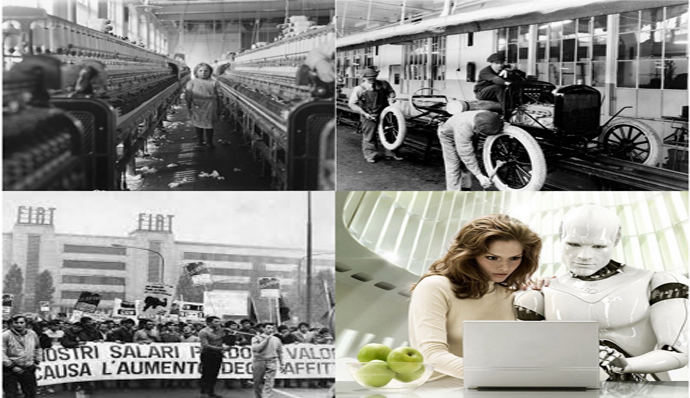By Doaa Hussein
After three industrial revolutions, now the world awaits a new industrial revolution, predominantly relying on technological innovation. The fourth revolution was announced at the World Economic Forum in Davos, two weeks ago, will hugely affect our living and working styles.
Despite being technologically centreed -as its predecessor- the new revolution is much higher in scope, velocity, and complexity. All stakeholders should be integrated in such a new technological tornado, including private and public sectors, as well as, academia and civil society.
Going back to 1784, the first industrial revolution managed to carve out a new way of making use of water and steam power in order to move global production forward.
In 1870, a new definition of electrical power was coined in the second revolution to mechanise production through electric power. The world relied on electrical power for almost a century, till 1969 when the third industrial revolution kicked up the salience of electronics and information technology in the human development. It was characterized by blurring the lines between the physical, digital, and biological spheres.
According to the World Economic Forum (WEF) report, the world is now performing in an exponential technological velocity, unprecendented by any means. It plays a pivotal role in evolving every industry in all countries.
Statistics say that billions of people are now using mobile phones. Now, there is no ceiling of access to all types of knowledge. The WEF anticipates this access to double in the new revolution, especially after emerging technology breakthroughs in fields such as, artificial intelligence, robotics, the Internet of Things, autonomous vehicles, 3-D printing, nanotechnology, biotechnology, materials science, energy storage, and quantum computing.
New opportunities:
For those who have access to the digital world, the fourth industrial revolution has started to alter their way of life mainly through raising their income levels.
Technology has eased many daily actions that can now be done remotely such as: ordering a cab, booking a flight, buying a product, making a payment, listening to music, watching a film, or playing a game.
In the future, new markets will be opened up to the global trade, that transportation and communication costs will drop heavily, linking world countries closer than before and forming a new era of globalisation.
However, a drawback is to come in the form of replacing workers with machines, which will exacerbate the gap between the returns to capital and returns to labour. On the other hand, there is a positive side to such development; economists speculate that this will create more rewarding and safer jobs, yet few. Hence, talent will be played up in the new revolution, far more than capital.
On another note, an aspect to be hit severely by the new revolution is inequality. Technology will increase the demand for high skilled workers rather than low income/low skilled ones. This will heighten up the social tension between the different social levels.
Implications:
The upcoming technological innovation is thought to impact three sides: Business, government, and people.
Regarding business, the new revolution will cause a great disruption to the current supply chains, creating new methods of serving people’s needs. This will also positively impact the quality and speed of service.
In a holistic view, there are 4 main areas that the fourth industrial revolution may have on business: customer expectations, product enhancement, collabourative innovation, and organisational forms.
Technology will also have a great effect on the government-citizens relationship. People will be able to voice their opinions to the cabinet more efficiently.
The government, as well, will have its performance enhanced through using high information technology.
Concerning the effect on people, technology will change the way we act, meet new people, foster our skills….etc.
We should also be prepared to the heightened side effect of the new technology, which will possess a greater ability to penetrate our privacy, cultivating more threats to our social lives.
To sum up, we all need to make best use of the fourth industrial revolution, and direct it to development, rather than greater disruption.


